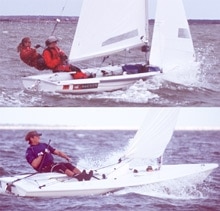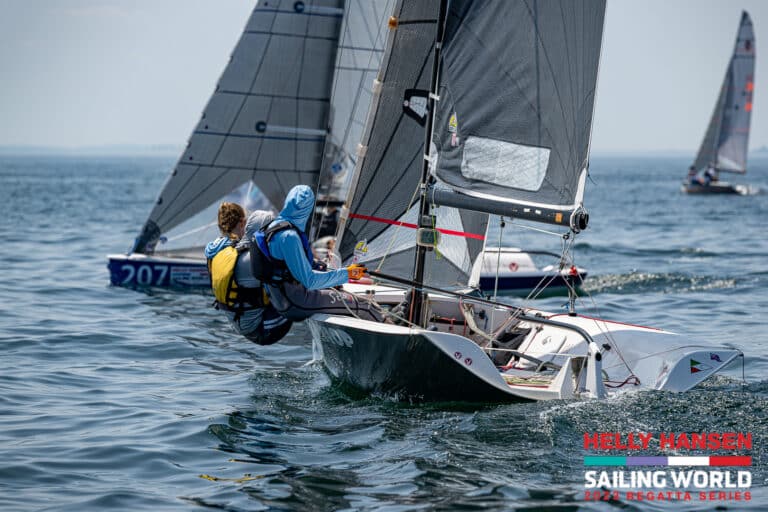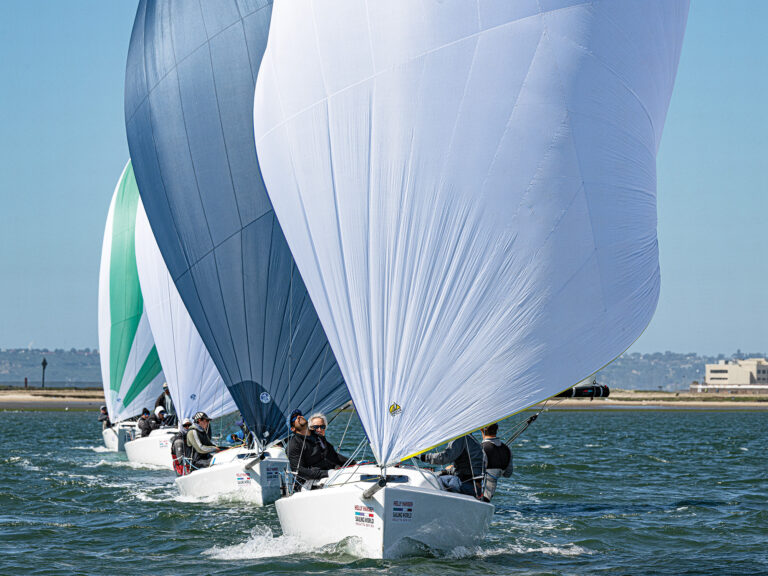
Olympic Int pt3
Over the past five Olympic Games, the U.S. Sailing Team has performed well, earning 27 medals out of 46 classes. This impressive performance will be tested in Athens. Competition is getting tougher. In fact, parity is the trend. For example, in Sydney in 2000, 16 countries shared 33 medals. And in Savannah in 1996, a record 23 countries earned medals. Still, in Athens, America’s chances are encouraging. The U.S. sailors have been working hard preparing for the Games. While all were definitive winners in their respective classes in the U.S. Trials, they’ve realized that qualifying was just the start of their preparation. I had a chance to interview each sailor and found their attitude to be very determined. Here are their thoughts. LASER: Mark Mendleblatt, 30 Who are you training with? I train with pretty much anyone who’s out there. Most of the guys arrive a week or so early before the major regattas and we all sail together. There are no tuning secrets in the laser and the guys who work the hardest and have good technique go the fastest. We old guys need to stick together. How helpful were the Trials in training for the Games? You have to train like you’re working up to a marathon and it takes a long time to get to that peak level. It takes a lot of hard work. Can Robert Scheidt be beaten? The short answer is no. There is no one who can beat that guy but himself. He’s more dominant than Michael Jordan and Tiger Woods put together. It’s a joy to watch him sail the boat and I feel honored to be one of the guys trying to get at him. Was college sailing helpful? It is the single biggest influence on my sailing. What are your prospects for a medal? No other U.S. Laser sailor has been in the top three in a major international regatta in the last four years. I was sixth in the Worlds last year. I am improving but in order for me to get a medal I’m going to have to find something more somewhere. MISTRAL WOMEN: Lanee Beashel, 34 Will past Olympic experience help? Past experiences from ’92, ’96, and ’00 will all help me in my preparation for 2004. You learn from past mistakes and take from past successes. The Olympic regatta is like no other regatta. Who do you think your toughest competitors will be? Everyone. We have 28 country spots in my fleet. The three returning gold medalists will be there. How physically demanding is racing a Mistral? With pumping allowed since the 1996 Games, the Olympics have gone to a whole new level physically. Pumping is composed of it’s own set of areas: off a start line, pumping up a beat, pumping to get on a plane, etc. It is a very physical sport. Are you totally drained after a race? At the Games we will be racing two races a day so you need to go all out in the first race and be able to recover in between races. For Athens they have scheduled a lay day after each day of racing. What do you think your prospects are for a medal? I’m going to be out there on the start line and just like me, everyone that shows up has a chance. MISTRAL MEN: Peter Wells, 30 How are you training for the Games? I’m spending as much time in Europe as possible. There is no mistral fleet in the U.S. so staying home isn’t productive. I am doing a lot of equipment testing and working on my fitness. What do you think your prospects are for a medal? It’s going to be a long regatta in Athens, 11 days from the first day of racing to the last day and I will be ready. 470 WOMEN: Katie McDowell, 28 Has your college experience been helpful in the 470? Yes and no. College sailing gives you a great sense of starting, the importance of it, the timing, and setting up strategies. But you are sailing boats that are very simple where there are virtually no “mode” changes. The 470 requires gear shifting with even a half a knot of breeze, and with the waves, you are constantly changing how you sail the boat, how you set the boat up, etc. When we get to the Games with the fleet size around 20, college sailing tactical skills will come to the forefront and we’ll be glad to have had that experience. Do you spend time tuning-up with the U.S. Men’s team? We do spend a bit of time working with Paul and Kevin. We have been on a more full-time program and have developed working relationships with different training partners who we train with more. Paul and Kevin both have family responsibilities and are often later showing up to an event than we are. But when we work together and working together, it’s great. What are your prospects? I think we have a really, really good shot at medaling. We’ve slowly been working our way up the world rankings and our regatta results have steadily improved. The worlds showed that we can race well even when we aren’t going fast and that’s a big thing. I think the smaller fleet size will be to our advantage with our past college experiences. 470 WOMEN: Isabelle Kinsolving, 24 Has your college experience been helpful in the 470? My college experience has been very helpful in close tactical situations. While Katie does all of our strategy and tactics it helps me to have a general view and feeling of what I think she is going to do. That way I can be better prepared to execute maneuvers. It also helps during post-race analysis so that we can examine what our options were and how we could have done better or worse. Do you spend time tuning-up with the U.S. Men’s team? Paul Foerster and Kevin Burnham have been fantastic teammates, very supportive and helpful. During qualifications they came out to our racecourse whenever they could to help us tune up. During the finals we would usually spend a lot of time tuning, both upwind and downwind. What are your prospects? I think there will be at least 8 boats capable of winning a medal, and Katie and I are right in the mix. We finished 5th at the Pre-Olympics last year, and now 8th at the Worlds. Thus far (knock on wood), Katie and I have done a good job under pressure, so I expect us to do well at the Olympics. We did a great job peaking for the Trials, and we need to replicate that process and improve on it for the Olympics. Part I of Jobson’s interview featuring the 49er, Yngling, and Finn classes, can be found here. Part II of Jobson’t interview featuring the Europe, 470 Men, Star, and Tornado classes, can be found here.









